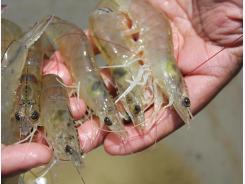Cefas develops technology to help combat shrimp disease

Cutting edge farmer-led disease diagnostics technology could help combat devastating disease outbreaks in global fish and shellfish production, saving up to USD 6 billion lost annually across the global aquaculture industry.
The UK’s Centre for Environment, Fisheries and Aquaculture Science (Cefas), a recognised world leader in aquatic food security, is working with governments and industry in the UK and Asia to develop new DNA-based diagnostic technology linked to data reporting by smartphone, which can be used by local famers at the “pond side” to rapidly detect potentially devastating diseases, such as the white spot syndrome virus (WSSV).
Cefas is leading field trials in Thailand, where diseases like WSSV and other emergent problems such as early mortality syndrome (EMS) have led to a halving of annual yield and profit (amounting to USD 2 billion) from the shrimp industry.
It is hoped that this revolutionary approach will help ensure that early detection enables faster management of infection and disease and more effective control of outbreaks, which in the past have led to serious impact on food supply and a loss of profits for the poorest rural communities engaged in farming.
Speaking at GREAT Week Agri-tech, as part of Milan Expo, Professor Grant Stentiford, Cefas, said: “Decentralised diagnostics combined with technology-driven field reporting has the ability to bridge the significant knowledge gap between farmers, scientists, aquatic health professionals, and policy makers at national, regional and global levels.”
“In countries where veterinary and diagnostic infrastructures are not as developed as the centralised networks established within the EU, farmer-led approaches offer the potential to better manage diseases and to safeguard local profit and a sustainable supply chain,” Stentiford pointed out.
The results of the field trials in Thailand during 2015 and 2016 will enable Cefas and partners to further develop this new technology, which is hoped to be available to industry from 2017.
Also attending the GREAT Week Agri-tech, Dr Wendy Higman, Business Development Manager, Cefas said:
“Developing new approaches to safeguarding food security will be increasingly important, with the global population projected to increase by 2 billion by 2050 and consumption of seafood in Asia alone projected to increase by 50 per cent."
“Cefas is working with a number of government and industry partners to develop specific technologies and we are looking to further these commercial opportunities. With the field trials beginning in Thailand, we have reached a significant milestone in this hugely important project. I am looking forward to discussing this further with interested parties during our time at GREAT Week, Milan Expo,” Higman added.
Có thể bạn quan tâm
Phần mềm

Phối trộn thức ăn chăn nuôi

Pha dung dịch thủy canh

Định mức cho tôm ăn

Phối trộn phân bón NPK

Xác định tỷ lệ tôm sống

Chuyển đổi đơn vị phân bón

Xác định công suất sục khí

Chuyển đổi đơn vị tôm

Tính diện tích nhà kính

Tính thể tích ao hồ




 Biosecurity For Shrimp Farms
Biosecurity For Shrimp Farms  Challenges of RAS technology
Challenges of RAS technology